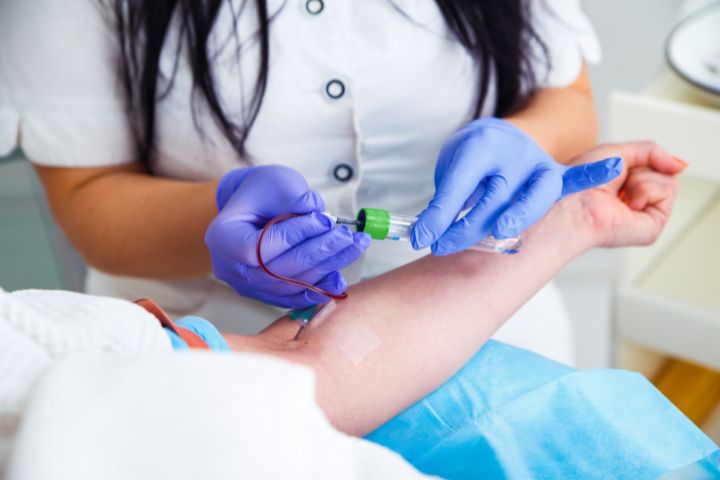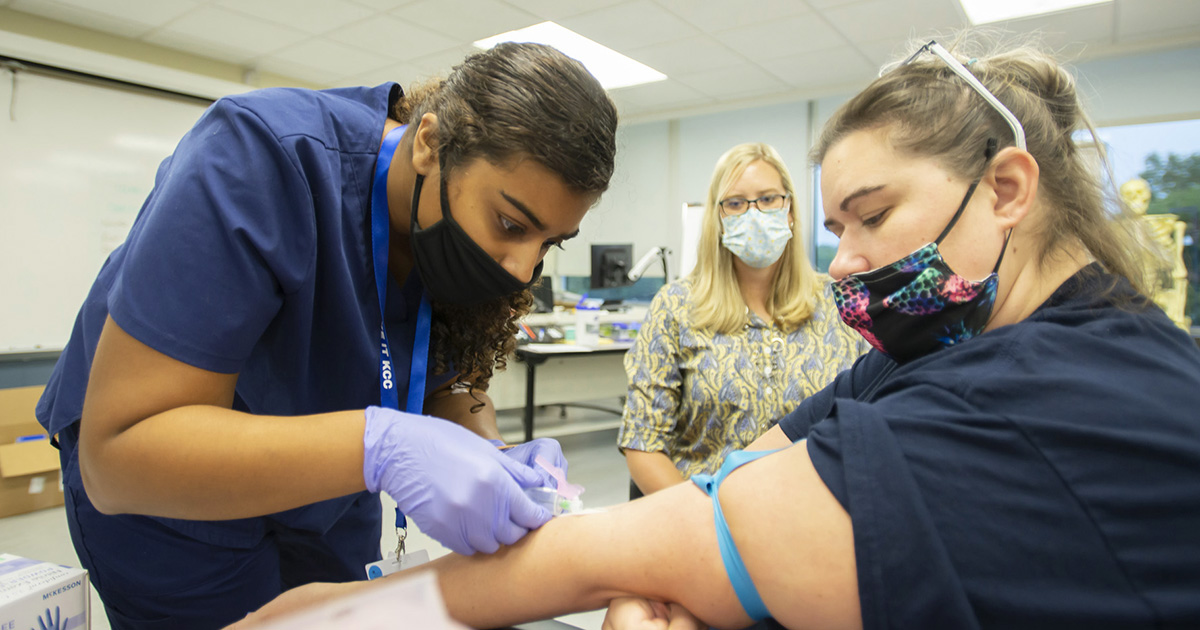How Phlebotomy Courses Near Me Can Fast-Track Your Entry into the Healthcare Field
How Phlebotomy Courses Near Me Can Fast-Track Your Entry into the Healthcare Field
Blog Article
The Path to Accreditation: Comprehending the Phlebotomy Training Program Trip and Its Value
As you take into consideration the course to certification in phlebotomy, it is very important to understand the role you'll play in healthcare. Your training will cover vital skills, from blood collection methods to patient communication. Each element of the program prepares you for the difficulties ahead. What exactly does the trip require, and why is qualification so vital for your future occupation? Allow's check out these questions further.

The Duty of Phlebotomists in Health Care
Phlebotomists play an important duty in the health care system, acting as the crucial link in between clients and essential analysis testing. You'll perform blood attracts, ensuring examples are gathered properly and safely. Your know-how assists in diagnosing clinical conditions, keeping an eye on health and wellness, and assisting treatment decisions.
In your everyday interactions, you'll need to develop depend on with people, making them feel comfy throughout what may be a difficult experience. You are in charge of labeling and managing examples thoroughly to stop contamination or mistakes, which could impact examination outcomes.
Beyond this, you'll usually function along with doctors and registered nurses, connecting critical info about individuals' problems. By mastering your skills, you contribute meaningfully to patient treatment, making you an essential part of the medical group.
Review of Phlebotomy Training Programs
When discovering phlebotomy training programs, you'll locate different types developed to fit different routines and learning styles. Each program helps you develop vital skills like blood collection and patient communication. Recognizing these choices is essential to choosing the right course for your occupation.
Sorts Of Training Programs
Numerous kinds of training programs are available for those looking to come to be skillful in phlebotomy. You can pick from certificate programs, which generally last a couple of months and concentrate on vital skills. There are additionally diploma programs that give an even more extensive education, often lasting approximately a year. If you're trying to find a deeper understanding, an associate level in a related area could be the best fit. Online training courses use versatility for those stabilizing work or family dedications, allowing you to research at your own pace. Additionally, some healthcare facilities and centers offer on-the-job training programs, supplying useful experience while you learn. Whatever course you choose, each program intends to furnish you with the required abilities for an effective phlebotomy career.

Trick Skills Created
Mastering phlebotomy requires a set of crucial abilities that are created via comprehensive training programs. You'll learn technical abilities like proper vein choice, needle insertion, and blood collection strategies. These hands-on techniques assure you can perform treatments securely and successfully. In addition, interaction skills are fundamental; you'll need to communicate with individuals, clarify procedures, and put them comfortable. Comprehending makeup and physiology is crucial, as well, as it aids you locate capillaries and recognize the body's feedback to blood draws. You'll gain knowledge of safety and security methods and infection control, ensuring you preserve a sterilized atmosphere. Each of these abilities is necessary for your success as a certified phlebotomist, making you a valuable asset in any healthcare setting.
Trick Components of a Phlebotomy Course
In a phlebotomy training course, you'll concentrate on important subjects that prepared for your future occupation. You'll engage in hands-on training that enables you to use what you've discovered in real-world setups. Both the core curriculum and functional experience are vital for your success as a phlebotomist.
Core Curriculum Introduction
While pursuing a phlebotomy training course, you'll come across a core educational program developed to furnish you with basic abilities and knowledge. Phlebotomy Training Course. This educational program commonly includes anatomy and physiology, concentrating on the blood circulation system and recognizing blood components. You'll also learn more about various sorts of blood collection methods, including venipuncture and capillary puncture techniques
Furthermore, infection control and security procedures are crucial components, ensuring you know exactly how to preserve a sterilized atmosphere. You'll research patient communication, emphasizing communication and empathy, which are vital for easing patient anxiety. Finally, ethical and lawful factors to consider will certainly be resolved, preparing you for real-world responsibilities. This fundamental understanding will enable you to excel as a phlebotomist and offer top quality treatment in professional setups.
Hands-On Training Experience
Getting hands-on experience is an indispensable component of your phlebotomy training course. This sensible training enables you to use what you've learned in a real-world setup, improving your abilities and confidence. Phlebotomy school.
Additionally, you'll obtain the chance to interact with patients, which is crucial for establishing your interaction abilities. This mix of technical efficiency and social skills is important for your success as a qualified phlebotomist. Ultimately, hands-on training is where theory fulfills practice, solidifying your understanding and preparedness for accreditation.
Qualification and Licensing Needs
Before you can start your occupation in phlebotomy, it is essential to understand the accreditation and licensing demands that differ by state. The majority of states require phlebotomists to hold a certification from an acknowledged organization, such as the National Phlebotomy Organization or the American Culture for Professional Pathology. These qualifications generally include passing an examination that checks your expertise and abilities in the area.
Along with qualification, some states have certain licensing demands. anchor You may require to complete a particular number of hours in scientific practice, submit proof of training, or undergo a background check. It is very important to investigate your state's regulations to see to it you meet all required requirements.
Remaining notified about these requirements not just assists you protect a position but likewise boosts your reliability as a professional. By fulfilling these needs, you'll be well on your means to an effective occupation in phlebotomy.
Hands-On Training and Practical Experience
Hands-on training and useful experience are vital components of your phlebotomy education, as they permit you to use theoretical knowledge in real-world scenarios. During your training, you'll take part in monitored venipuncture, find out appropriate techniques, and come to be acquainted with various blood collection tools. This straight involvement is critical for constructing your confidence and honing your abilities.
You'll work very closely with knowledgeable professionals that can assist you through the subtleties of client communication and sample handling. Each session not just reinforces your understanding yet likewise prepares you for the fast-paced setting of health care setups.
Furthermore, numerous programs incorporate professional rotations, permitting you to experience diverse setups, from health centers to outpatient centers. This exposure assists you adapt to various difficulties and person requirements, ensuring click now you're well-prepared for your future function. Embrace these possibilities, as they're necessary to ending up being a proficient and compassionate phlebotomist.
Obstacles Faced Throughout Training
While getting hands-on experience is important, it is essential to acknowledge the obstacles that can occur throughout your phlebotomy training. You might run into stress and anxiety when performing treatments on real individuals, particularly if you're brand-new to the environment. The stress to get every little thing right can be overwhelming. In addition, mastering the abilities needed for blood draws takes technique; you may battle with method at first.
Time management can additionally be a hurdle, as balancing concept, practical sessions, and personal dedications can really feel daunting. You might encounter differing finding out rates amongst your peers, causing sensations of self-doubt if you believe you're falling back. Adapting to the different personalities of instructors can be tough, as each might have a special mentor style.
Recognizing these obstacles at an early stage can prepare you for success and assist you establish resilience throughout your training trip.
Job Opportunities After Qualification

As you acquire experience, you could also take into consideration focusing on locations like pediatric or geriatric phlebotomy, providing to particular person needs. Some phlebotomists pick to advance their occupations by coming to be lab technicians or going after more education in medical care fields.
Furthermore, your certification can result in duties in training or supervising brand-new phlebotomists, permitting you to share your knowledge. With the health care sector constantly expanding, your abilities will certainly always be in demand, leading the way for a steady and meeting career. Accept the possibilities waiting for you!
Often Asked Concerns
What Is the Regular Period of a Phlebotomy Training Program?
Phlebotomy training programs commonly last around four to eight weeks. You'll engage in hands-on method, class instruction, and online discovering. Finishing this training prepares you for certification and a gratifying job in healthcare.
Are Online Phlebotomy Courses Available?
Yes, on the internet phlebotomy programs are offered. They use adaptability and ease, permitting you to research at your very own pace. Just verify the program is certified to satisfy accreditation demands and get useful abilities for your job.
Just How Much Does Phlebotomy Training Usually Cost?
Phlebotomy training generally costs between $700 and $2,500, depending upon the program and place. You should consider factors like course size, consisted of products, and hands-on experience when picking the ideal training for you.
What Are Usual Prerequisites for Phlebotomy Training?
Usual requirements for phlebotomy training frequently include a high institution diploma or this website GED, immunizations, and a history check. Some programs may also call for fundamental health care understanding or certifications, guaranteeing you're planned for hands-on training.
Can I Work While Completing My Phlebotomy Training?
Yes, you can function while completing your phlebotomy training. Numerous students equilibrium work with their researches, however make sure to handle your time effectively to guarantee you fulfill both work and training dedications efficiently.
Report this page